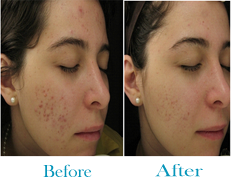ACNE TREATMENT

WHAT MAKES ACNE SCARS BETTER?
Cortisone and Fade Creams
First, if the scar is red or swollen, use an over-the-counter cortisone cream to calm the skin, says Alster. The cortisone is absorbed by skin cells and reduces inflammation. Next, you’ll want to concentrate on lightening any hyperpigmentation left from the acne scar.“Hydroquinone, a popular skin lightener, has recently fallen out of favor and is now being omitted from many fading creams due to irritation and carcinogenic concern,” says Alster.
But there are other ingredients to look for over-the-counter that help lighten hyperpigmentation. Kojic acid (a natural skin lightener derived from mushroom extract), arbutin (aka bearberry extract), and even vitamin C (ascorbic acid) are great alternative ingredients to look for in over-the-counter lightening creams, notes Alster. Unfortunately, there is no over-the-counter treatment that can fill in the indentations of atrophic acne scars.
Laser and Filler Treatments
If your acne scars don’t fade away on their own, it may be time to consider booking an appointment with your dermatologist. Within one to three sessions, laser skin resurfacing using fractionated laser technology can even out the skin surface and increase new collagen formation to help fill in acne scars.
Non-ablative lasers stimulate the production of collagen without damaging the skin's surface. Meanwhile, ablative lasers (i.e. CO2 and erbium) vaporize the scar, allowing smoother skin to take its place. Filler injections can also prove beneficial at filling in the indentations left behind from deep acne scars, says Moy. But the downside to fillers is that they need to be repeated every four to six months, as the product re-absorbs into the skin over time.


